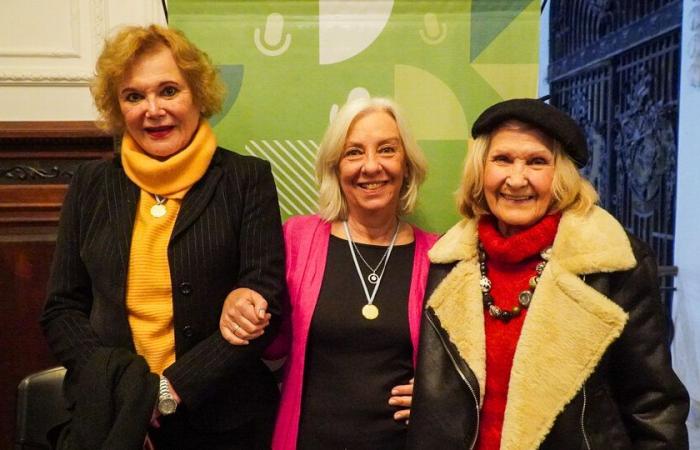The Radio UNSa 93.9 and the General Coordination of Libraries and Archives of the Secretariat of Culture of Salta premiered yesterday the sound cycle “The Voices of the Women of Radio in Salta”, a proposal that rescues the lives of prominent women in Salta radio. With the presentation of medals and surrounded by their families and friends, they were honored Mary Gervino, Marita Couto, Gloria Franco and Juanita González.
Through the creation of sound pieces, the trajectories of these four pioneers in voice-over and journalism in radio and television media in the province were delved into. This first cycle aims to tell the events in the places that are inhabited daily through the voices of women who were protagonists, thus building “our history and keeping the memory alive,” they expressed in the presentation that took place in the hall of the Zorrilla Palace. , in the former Rectorate of the National University of Salta.
Another reason for undertaking this file construction process was the intention to create content with a gender perspective, which implies – among the various topics to be discussed – the possibility of “making visible the work of women who have historically worked in the media in Salta, especially in what has been radio.” From this premise arose the articulation with the Media Library of the Historical Archive and Library “Dr. Joaquín Castellanos” of Salta, which guaranteed “putting the voices of women who currently continue to work in some radio stations, but who have worked throughout their lives in our province.”
In the sound pieces not only the lives of these four women stand out, But they themselves also talk about other women who are no longer here and who have been their teachers. After receiving the tribute Gervino, Couto and Franco (González could not attend) They demonstrated unanimously in defense of Radio Nacionalwhich they described as an essential service for the country: “Radio Nacional is not going to close”said Franco, after receiving his recognition.
Gloria Franco She is from Santa Fe, but she already feels like another woman from Salta. She has been working for 54 years in different media in the province, both radio and television. And in dialogue with Salta / 12 she considered that “speech is a task, an ideal profession for women,” “it is something beautiful that is done with great vocation.” Although she said that currently male voices are heard a little more, she stated that “mixed speech is very pleasant, especially for the audience.”
Regarding the task of building archives, he valued that it is “very good for marking different stages, and ways of speaking over time.” Franco was grateful for being summoned for this process and stated that the creation of the sound pieces “will go down in history.”
For her part, Mary Gervino said she was “marveled” by the production. In addition to being a journalist and broadcaster, she is an actress, and the combination of both practices allowed her to stand out. in different radio drama cycles, which were broadcast by Radio Nacional Salta and other stations. She confessed that remembering her career was “very emotional, because I started very young in the radio, I was only nine years old.” In a few days she will turn 84, and “having been recognized once again always excites me.”
It was not until she was 20 that Gervino made the decision to work in broadcasting: “I wanted to talk to someone to tell them that I wanted to be a broadcaster,” she recalled. He asked for the job at the station where he was, but they denied him. He left a few days later and started working making radio plays with several local companies. ““I became known and later I was a presenter on programs and then that’s where I also started my career on television,” remembered this medium.
Each of the sound pieces for the archive was recorded in the Radio UNSa studios. In the case of Marita Couto it is a known territory, given that she was its director between 1999 and 2013. Still, she said the call was “a pleasant surprise.” She highlighted the quality of the production and highlighted “the way they treated us, sending us a questionnaire to reflect our memory, it was really very gratifying and left me surprised.”
She also stated that the revaluation work that was carried out not only allowed the work of women in radio to be highlighted, but also highlighted Salta radio in general. “They killed her so many times and she is still alive and providing the best information. I had the honor of directing the radio station of the National University of Salta for almost 15 years,” she recalled. “We women had and have a role to play and I really encourage you to continue with this work. We may have been the first, but there are many more who have left their mark on radio work,” she said.
The pieces are now available on Radio UNSa’s YouTube and Spotify channels, in addition to circulating on the station’s dial. In yesterday’s presentationThe audios and the piece that tells the history of radio in Salta had the voice of Lía Plaza, who died in 2020, and to whom tribute was also paid. A live radio drama was also presented, by the chair of History of Regional Theater of the Higher Institute of Art Teachers (ISPA), with fragments of the work “Pachamama”, by Amadeo Rodolfo Sirolli.
Rescue, preserve and make visible
The person in charge of the Archive and Library Media Library, Ana Soleroutlined in the presentation that one of the lines of work of this organization is to “rescue, preserve and curate certain historical and testimonial records”, thus allowing “to bring them to the present, make them visible, disseminate them and create/generate awareness about the importance of our historical sound heritage”.
He said that the selection of the voices had several reasons: in general, in the archives of the province women’s participation is much lower; The four are precisely the ones who had the least background in that reconstruction; andThe story of these women was combined with already recorded files, mainly, those linked to radio programs or radio plays in which they themselves participated.
Soler assured that The preservation of oral memories implies “that historical materials arrive that represent some of the journeys of references and women who were pillars for the beginnings and the maintenance, to a certain extent, of the first decades of radio.” He considered that the production of this material enabled the construction of a bridge with the present. “I think in that sense It is very necessary to raise awareness regarding the void that exists, the absence of archives and the importance of preserving and making public access to this type of projects or dissemination campaigns.“he insisted.
For its part, the promoter of the initiative, the Content Coordinator of Radio UNSa, María Eugenia Rocha Alfaro, He stressed that “much more is always known about the work that men have done, and perhaps very little about what this work has meant for women.” For this reason, “not only is this work vindicated, but it is also known how they have performed throughout these years and What has this work been like within the framework of the different historical contexts of our country?“.
At the opening of the event the rector of UNSa, Daniel Hoyos He highlighted the work and defended National Radio. He considered “an important task” to tell what “happened in the places we inhabit daily from the voices of those who were protagonists.”
For her part, the general coordinator of Libraries and Archives of the Ministry of Culture, Paula Bertinisaid that permanent collaboration with UNSa radio is of vital importance for “the rescue, recovery and enhancement of sound archives,” which allows “to position the historical archive in the community and be a reference in the reconstruction of the history and memories of the 20th century in our province.”
Likewise, she highlighted that revaluing the role of women who are part of Salta radio is essential since “They are the first voices to appear in the mass media, both on radio and television, and they represent an era, a way of doing journalism, a way of being in the news, a way of becoming protagonists in the daily life of households.” “which were slowly beginning to incorporate television and which had radio as an element and a permanent presence in homes.”
While the director of Radio UNSa 93.9, Ariel Anze, celebrated the premiere of the cycle. He said that they have been working together with the Coordination of Libraries and Archives and now adding a sound cycle is very important. “We believe that from a public medium like our radio it is important that this type of material be produced so that it is revalued, disseminated and sound archives of oral memories are generated, especially the voices of the women who marked the history of radio in Salta,” he said. And he thanked the work done by the radio’s technical team, such as Rogelio Chiriguay, Ariel Fernando Arbilla and Gonzalo Zorrilla.
Also the Undersecretary of Institutional Communication of the Rectorate, Victor Notarfrancesco, He stressed that it is a decision of the current management to promote an archives policy. “We believe that working towards the construction of memory and our history is vital to be able to position ourselves in the different situations that we face every day,” he said.






